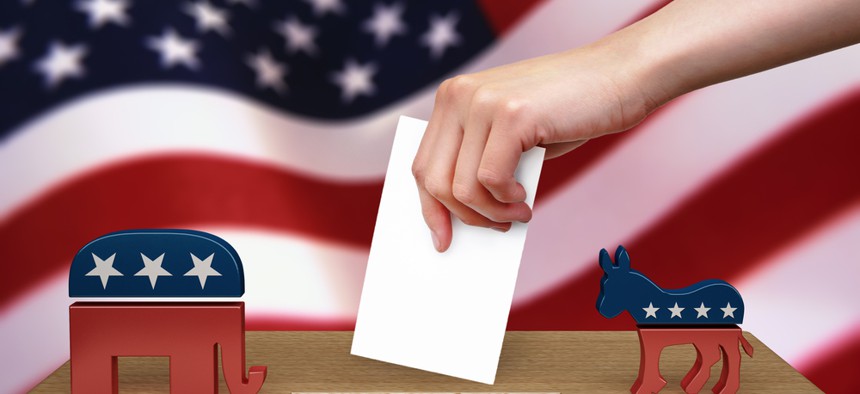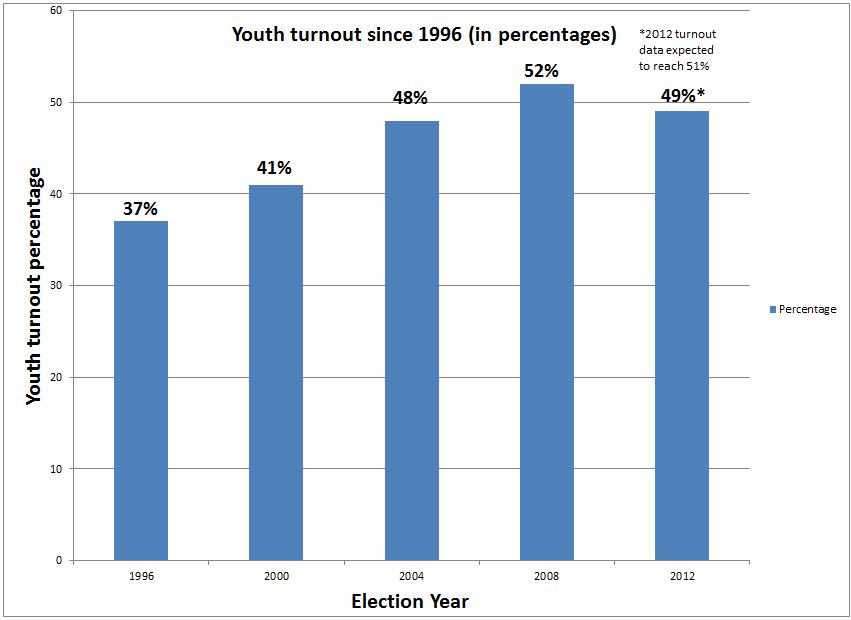
Image via Peeradach Rattanakoses/Shutterstock.com
Youths Carry the Vote, Research Study Says
The idea that young people don't vote might have been put to rest in 2012.
The millennial generation provided at least 80 electoral votes for President Barack Obama last Tuesday.
More than 22 million voters ages 18 to 29 cast ballots in this election.
Peter Levine, director at the Center for Information and Research on Civic Learning and Engagement at Tufts University said voter turnout for young people tallied at least 49 percent, creating a new normal for voter demographics in the U.S. He said he expects the percentage to increase to as much as 51 percent as more results are released.
In 2008, youth voter turnout was 52 percent.

Data source: Center for Information & Research on Civic Learning and Engagement
Youth turnout matched the turnout results of 2008 statistically, but youths also increased their electoral representation in this election, Levine said.
Although the percentage of young voters was similar to the 2008 election, young voters were able to create a more influential role in the electoral college, increasing youth representation as an electoral stronghold.
In 2008, young voters represented 18 percent of the voting population, which is 1 percent less than current youth voter share estimates.
Levine said the single percentage increase to 19 percent means young voters were more represented in the electorate this election year than previous years.
Heather Smith, president of Rock the Vote, said this year’s election proves that the millennial generation cares about the election and wants to be heard.
“I think we’ve now established a very fairly decent pattern that this generation is different than their older brothers and sisters and can put those rumors about youth to bed,” Smith said.
Levine said if youth voters did not participate in the election in Ohio, Virginia, Pennsylvania and Florida, or if former governor Mitt Romney had won half of the youth vote, these states would have flipped from blue to red.
He said losing the youth vote lost the election for Romney.
“It is because he lost the youth group pretty decisively that he is not going to be the next president,” Levine said.
An estimated 17 million youths have turned 18 since the last election, granting them eligibility to vote.
Smith said she expected youth voter turnout to be lower.
“We knew all along that they cared,” she said, “but the campaign was just different than 2008.”
Levine and Smith said some youth voters were confused about the election, and the campaigns didn’t treat young people well.
“An awful lot of young people were confused about policy issues, and I think that this was a very confusing campaign to follow,” Levine said.
CIRCLE polling data showed that there was a decline in youth voter enthusiasm in this election, Levine said. Despite possible confusion and lack of enthusiasm, voters still turned up.
“They may not have been enthusiastic or happy about the campaign, but they were persistent,” Levine said.
From 2000 to 2004, youth voter turnout increased from 41 percent to 48 percent, indicating that voter turnout has consistently increased regardless of which candidates were running for president.
“Yesterday, young Americans showed up, voted and made it clear that they are the generation that will take our country forward,” Smith said.
(Image via Peeradach Rattanakoses/Shutterstock.com)







